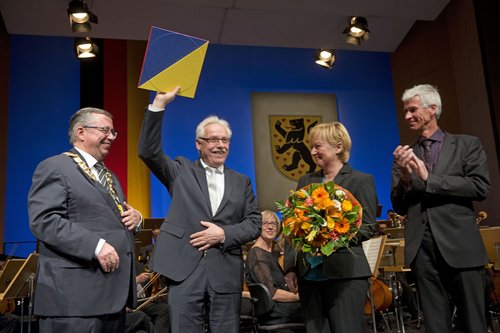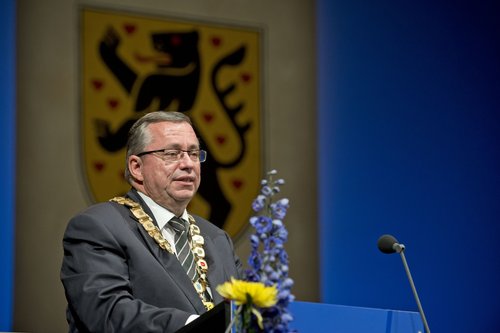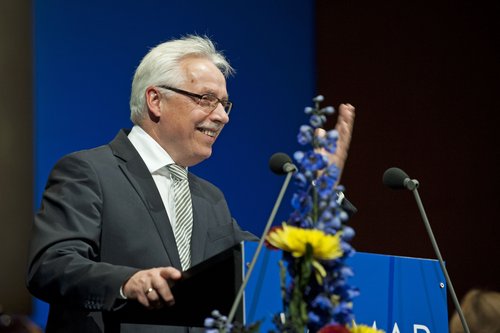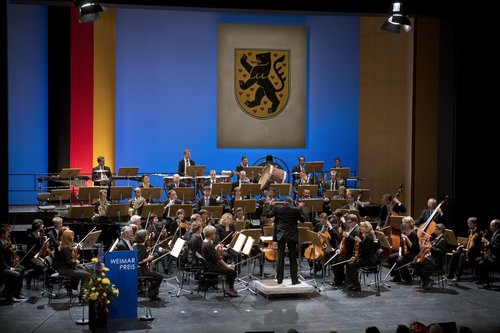»For Outstanding Service to City Life, the City and Its Future«: Professor Dr.-Ing. Gerd Zimmermann Receives the 2012 Weimar Prize
Weimar honoured Professor Dr.-Ing. Gerd Zimmermann with its Weimar prize this year. Mayor Stefan Wolf presented the renowned prize to the former President (Rector) of the Bauhaus-Universität Weimar at a meeting of the city council on Wednesday, 3 October, 2012, at the German National Theatre.
Mayor Wolf praised Zimmermann’s service to the City of Weimar, in particular his success as rector of the Bauhaus-Universität Weimar and in his role as a member of the city’s architectural advisory board. In addition, he recognized Zimmermann’s constant networking efforts to make the university and with it the city of Weimar internationally visible:
»Professor Zimmermann represents the new, the modern, in our city. As chair of Theory and History of Architecture and in his many years of service as President, he ensured that the Bauhaus-Universität, in the tradition of the original Bauhaus, bound art with technology and media with culture. This was unique in the Federal Republic. And this new thinking flowed into Weimar and out into the world. Gerd Zimmermann succeeded in having Weimar recognized as a modern city that stands open to the questions in art and design, aesthetics, media, film, and architecture«.
Speaking in praise of Professor Zimmermann, Professor Dr. Lorenz Engell summarised Zimmermann’s significance to the city of Weimar: »You provided outstanding service to the life of the city and city itself. And that means you provided outstanding service to the city’s future«. He took on the task of preserving the legacy of the Bauhaus, but he did more than that—he created something new, a contemporary Bauhaus: »You took the legacy of the Bauhaus and made a new university, a truly unique and truly ›cool‹ place, an insider’s tip among the universities. And with that you created an institution of knowledge and research, of sciences and arts, and gave them your own special stamp. Since then, science and art is not merely contemplated in Weimar, but practiced. Without you, there would be no Bauhaus-Universität Weimar«.
Mayor Wolf presented Professor Zimmermann the prize—designed with the Bauhaus colours of red, yellow and blue and the symbols triangle, circle and square—amidst great applause. In his acceptance speech, Professor Zimmermann compared Weimar with a »multiple personality«:
»It is enigmatic, but also alarming in its depths, banal, sometimes curmudgeonly in its day-to-day life, enchanting in its beauty, a diva that possesses all airs and graces. The city presents a nostalgic image of harmony but it is marked by scars that were made by the torn construct of German history. The vexing fascination of this city comes not from its smooth surface, but from its fluctuating base. Weimar is a concave mirror of history, precisely because it is so microscopic and simultaneously gigantic, a nest in the provinces and an international metropolis. Everything here is re-enacted, a masquerade. And despite that, it has depth, significance. Nothing seems to go together here. Here, the onion market that doesn’t want to end with its Onion Queen, who is present here today; there, the community of Classics traversed by horse-drawn carriages; but also the abyss of the concentration camp that can never be understood and the unbelievable experiment of modernity, on whose trail people with big black or white glasses stroll: Bauhaus. To receive a prize from such a city is for me, ladies and gentlemen, a high honour and I wish to thank you, honoured members of the city council, for awarding me this prize«.
Professor Zimmermann served a total of three terms as rector of the Bauhaus-Universität Weimar beginning in 1992 and had a great influence on the university’s development during that time, newly defining its profile and expanding and redesigning its content and structure. The Bauhaus-Universität Weimar became one of a kind in German higher education under his leadership. At the beginning of his first term in 1992, he formulated his vision of a »new Bauhaus«, of a university that is equally devoted to art and technology and thereby oriented towards interdisciplinarity. He was always intensely involved in the internationalization of the university and in the process established the world-wide star-power of the Bauhaus.
The Weimar-Prize 2012 ceremony happened to fall on the Day of German Unification. The ceremony in the German National Theatre was attended by guests from the city, politics, science, culture and business.
More information about Professor Dr.-Ing. Gerd Zimmermann







